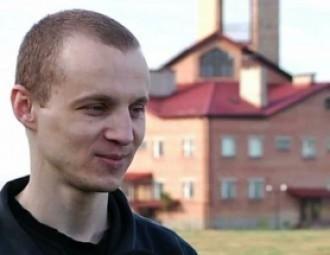Zmicier Dashkevich: I can show you every corner of my hospitable country

Minsk hosted the Ice Hockey World Championship in May; however, it didn’t cancel the problem of political prisoners, who continue serving their terms in Belarusan prisons.
Zmicier Dashkevich, a Belarusian dissident who served time in twelve prisons shows a side of his country that sports fans might not get to see.
Are you going to the Ice Hockey World Championship in Minsk this month? If you like, I can be your guide to Belarus. Belarus is a country in Eastern Europe between Poland and Russia, to the north of Ukraine. Welcome to the capital, Minsk. Here on Independence Square stands the Belarusian Parliament, and conveniently situated right behind it – the central prison.
In that building, I was incarcerated in a cell for fifty prisoners, measuring just 40 square metres, that makes 80 square centimetres per inmate. These cells hold eleven, two or three-storey bunk beds; in the middle of the room stands a table – one metre across and three wide. In the corner, a toilet and washbasin, mounted straight onto the concrete floor and surrounded by a metre-high concrete partition. The bunk space is not sufficient, and the fifty inmates take turns to sleep – one group during the day, another at night. Prisoners use the toilet without privacy, seen by their cellmates. And then there are the fleas…
A few metres away from this cell, we find ourselves on an immaculate, spotless boulevard. ‘How clean, how orderly!’ you exclaim, ‘How European!’ Moving on, we reach Glubokoye, a small town in western Belarus, and birthplace of the great aerospace engineer Pavel Sukhoi. There’s a lake to your left, a lake to your right, and between them stand majestic Orthodox and Catholic churches in Baroque style. Glubokoye prison is housed within a 17th century Basilican monastery.
Most of my imprisonment here was spent in the punishment cell, in solitary confinement. It is a cell for those who ‘cannot be re-educated’, although one can end up here for anything, from refusing to be subjected to the slave labour which pays a dollar a month, to forgetting to button up your shirt. As a particularly ‘obstinate heretic,’ I spent weeks and months here. In winter, you stand shivering from the cold in a thin cotton robe, breathing steam as you exhale. Mattresses, pillows, and blankets are forbidden in solitary, so the prisoner goes to sleep on the bare floorboards in the same thin robe. You will wake up from the cold and, after sitting up, arms wrapped tight around yourself to warm the body, collapse again from exhaustion. A little warmer, you will sleep for another hour before being woken by the cold. This will continue throughout the night. After a month, a person in solitary becomes an automaton. You have to.
Are you still with me? Then let’s continue. Before us you see Vitebsk – birthplace of the artist Marc Chagall. All in all, I have had to spend time in twelve penal colonies and prisons across Belarus, so I can show you every corner of my hospitable country. Vitebsk prison, unquestionably, outdid them all – from ‘Volodarka’ (Minsk’s Pishchalauski Castle) with its fleas, to the solitary confinement of Glubokskoye. In Vitebsk, prisoners were not permitted to carry spoons – whether iron, plastic, or wooden. The administration distributes spoons only for morning, lunchtime, and evening meals when kasha is doled out. As for the kasha itself, there is nobody or nothing in existence that could eat it.
As a result, prisoners are humiliated – even if they somehow manage to obtain food to cook for themselves, they can do so only in aluminum mugs without handles (no other dishes are permitted) and eat their pasta using a toothbrush case. That is, should the administration allow toothbrush cases.
If a prisoner wishes to brew tea, he must pour it using the same aluminum cup and the same toothbrush case, from which he must also add sugar. You would think that such humiliation would not be possible in the geographical centre of Europe, in the 21st century, in a country hosting an Ice Hockey World Championship. Despite the fact that I have sat in those prisons myself, chewing on a toothbrush case trying to eat pasta from an aluminum mug, I can still hardly believe it. In other countries such treatment would be called torture, in Belarus we proudly describe it as a ‘re-education process.’
In recent months all attention has been focused on Ukraine, which Putin has seized in a stranglehold. Belarus lies nearby, an example of what became of a European country which entered the Customs Union. I regret that the Ice Hockey World Championship in Minsk has not been cancelled. It is immoral when sports officials allow tyrants to use sport to strengthen dictatorships. But since it seems as though the Championship has not been cancelled, and that you are still coming to visit us, to our broken civilization, I want to ask you something: when your national team plays, bring sheets of paper with you to the arena and write the following on them: ‘Freedom for political prisoners in Belarus!’, and ‘Freedom to Eduard Lobau, Ales Bialiatski, and Mikola Statkevich!’ – freedom to those people who still languish in Belarusian prisons, sacrificing themselves for the ideals of freedom and justice.
Originally published on OpenDemocracy
-
03.01
-
07.10
-
22.09
-
17.08
-
12.08
-
30.09








































